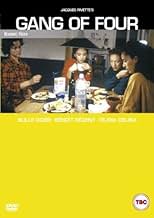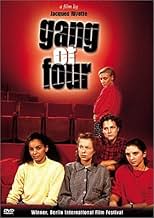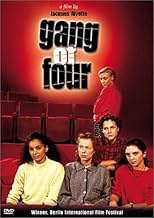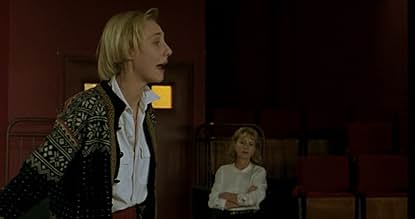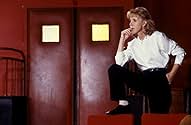IMDb-BEWERTUNG
6,8/10
1210
IHRE BEWERTUNG
Füge eine Handlung in deiner Sprache hinzuA drama following 4 women at stage school. Considered by some to be the summation of director Jacques Rivette's work as a whole.A drama following 4 women at stage school. Considered by some to be the summation of director Jacques Rivette's work as a whole.A drama following 4 women at stage school. Considered by some to be the summation of director Jacques Rivette's work as a whole.
- Auszeichnungen
- 3 Gewinne & 2 Nominierungen insgesamt
Inês de Medeiros
- Lucia
- (as Ines d'Almeida)
Handlung
WUSSTEST DU SCHON:
- WissenswertesLucia talks to the ghosts and recites some kind of spell in her native Portuguese language. It is inferred that she is a witch. This may be an implicit reference to Julio Cortazar's Rayuela, whose main character, La Maga (real name, Lucia), is also a witch, of Uruguayan descent. The image of both heroines is very similar, in addition to the name. And Rayuela is also set in Paris.
- VerbindungenFeatures Grausames Spiel (1983)
- SoundtracksHor ch'el ciel e la terra
Music by Claudio Monteverdi
Solistes, choeur et orchestre de la Societa cameristica di Lugano
Conducted by Edwin Loehrer
Ausgewählte Rezension
"Gang of Four" is hard to find words for. However I think it does address, in a detached and engaging manner, the themes of coming-of-age and community in the lives of several young women at an elite prestigious acting school?
And gender seems to be the most specific definer of these themes. The teacher, Constance, at some point in her professional career, made the decision to exclude male students from her school. This in turn informs the lives of her young actors, who are each expected to play male role and female roles. Claude seems especially affected by this form of teaching and experiences much confusion in discerning men and in her own gender identity.
Lucia, another of the four, has disgraced her family over her refusal to marry a pre-selected husband. Anna, whose actual name is Laura, takes this name to hold the memory of her missing sister close to her thoughts and actions. Cecile is not one of the gang of four (she left this residence house earlier) but she is having much of her identity shaped by a relationship to Antoine, who seems to be involved in some kind of dubious radical or criminal activities (this was never clear to me).
And then there's Thomas who seems to be the cross between a mole and a eunuch, who slithers into the the female household, in his ostensible pursuit of the elusive Antoine. However, his unstated purpose seems to be to disrupt and control the individual lives and growing commonality of the four women. He manipulates one woman against another by seduction, lies, and feigned heroism. And with an unrelenting mocking presence for which he has no compunction he puts the full disruptive burden of his presence onto them If it's Constance's resolve to exerts a kind of pressure on her charge's youthful insecurity and dependency and steer them clear of false emotions, Thomas' resolve is to break their solidarity, not test it.
Despite the drama on and off the stage, and all the motion, energy, body language, gestures, declamations, and tantrums, the general effect is both low key and even. No one stands out except perhaps Laurence Cote and Bulle Ogier as Claude and Constance. In the end, all the closures and variables in the lives depicted seem begin to co-exist. The young women come to inhabit their own scripts, and this in a world without and sometimes in spite of men.
And gender seems to be the most specific definer of these themes. The teacher, Constance, at some point in her professional career, made the decision to exclude male students from her school. This in turn informs the lives of her young actors, who are each expected to play male role and female roles. Claude seems especially affected by this form of teaching and experiences much confusion in discerning men and in her own gender identity.
Lucia, another of the four, has disgraced her family over her refusal to marry a pre-selected husband. Anna, whose actual name is Laura, takes this name to hold the memory of her missing sister close to her thoughts and actions. Cecile is not one of the gang of four (she left this residence house earlier) but she is having much of her identity shaped by a relationship to Antoine, who seems to be involved in some kind of dubious radical or criminal activities (this was never clear to me).
And then there's Thomas who seems to be the cross between a mole and a eunuch, who slithers into the the female household, in his ostensible pursuit of the elusive Antoine. However, his unstated purpose seems to be to disrupt and control the individual lives and growing commonality of the four women. He manipulates one woman against another by seduction, lies, and feigned heroism. And with an unrelenting mocking presence for which he has no compunction he puts the full disruptive burden of his presence onto them If it's Constance's resolve to exerts a kind of pressure on her charge's youthful insecurity and dependency and steer them clear of false emotions, Thomas' resolve is to break their solidarity, not test it.
Despite the drama on and off the stage, and all the motion, energy, body language, gestures, declamations, and tantrums, the general effect is both low key and even. No one stands out except perhaps Laurence Cote and Bulle Ogier as Claude and Constance. In the end, all the closures and variables in the lives depicted seem begin to co-exist. The young women come to inhabit their own scripts, and this in a world without and sometimes in spite of men.
Top-Auswahl
Melde dich zum Bewerten an und greife auf die Watchlist für personalisierte Empfehlungen zu.
- How long is The Gang of Four?Powered by Alexa
Details
Zu dieser Seite beitragen
Bearbeitung vorschlagen oder fehlenden Inhalt hinzufügen

Oberste Lücke
By what name was Die Viererbande (1989) officially released in India in English?
Antwort
